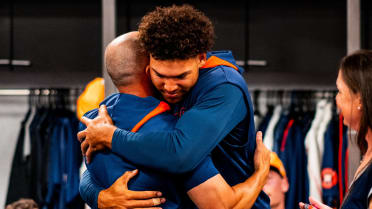The Rangers entered the 2024 MLB Draft looking to further improve the organizational outlook of an already-bright future after securing their first World Series title last season.
As Day 3 came to a close on Tuesday, Texas appears to have accomplished that goal.
Picking outside of the top half of the first round for the first time since 2017, Rangers director of amateur scouting Kip Fagg felt it was crucial to maximize the value of the 30th overall pick with a wider range of prospects to choose from at that spot. Texas seemed to do exactly that by taking Stanford catcher Malcolm Moore, effectively setting the tone for its remaining 19 picks.
2024 Draft presented by Nike:
Draft Tracker | First-round signings | All-time biggest bonuses
Pick-by-pick analysis: Day 1 | Day 2 | Day 3
Bazzana goes No. 1 | Wake Forest makes history | Mariners nab switch-pitcher | Top 7 Day 1 storylines | Best hauls | Our favorite picks | Famous family ties | Biggest steals | These picks could be new club No. 1's | Picks who could be quickest to bigs | Sons of Manny, Big Papi selected | Complete coverage
While the Rangers aimed to stay true to their philosophy of selecting the best available option every time they were on the clock, there was still plenty to take away from their 2024 Draft:
Addressing catching depth
In selecting Moore, who entered the Draft ranked as the No. 26 prospect in the class per MLB Pipeline, Texas is hoping to add high-quality depth to its system behind the plate. Fagg said the Rangers don’t draft for need, but the club is certainly thin at the position, with only one backstop -- Jesus Lopez (No. 29) -- ranked within the club’s Top 30 prospects list.
Jonah Heim has emerged as a stalwart for the Rangers over the past two seasons, but if Moore were to rise through the system quickly enough, he could end up challenging Heim for regular reps at that spot. It’s easy to see why.
Moore’s advanced approach and plus power made him one of the most dangerous hitters in the Pac-12, as he belted 31 home runs across 118 games at Stanford. Along with slugging at a .560 clip during that span, Moore also showcased elite plate discipline, particularly this past season, when he walked 44 times while striking out just 35 times and reaching base in all but five of his games en route to receiving a Pac-12 All-Conference honorable mention.
While Moore doesn’t project as well defensively, the Rangers believe he can still stick at catcher long term.
Texas also selected three catchers on Day 3: Josh Springer out of Corona (Calif.) Senior High School, Kansas’ Ben Hartl and Mac Rose out of McLennan Community College (Waco, Texas).
“I think we thought this was a very deep catching Draft,” director of amateur scouting operations Adam Lewkowicz said. “I don’t really see it as an organizational need. There was just a lot of value in the catching group. We tried to identify the guys that we felt met our standards and that we liked, and we went after them.”
A 'college heavy' Draft
Last year, 12 of the Rangers’ 20 selections were college players, including their first-round pick, Wyatt Langford, who has already managed to make a sizable impact in his debut season.
Texas’ recent success with drafting and developing experienced college players has been well documented, so it wasn’t surprising to see the team lean into that trend this year -- especially at the top of the Draft.
Seventeen of the Rangers’ 20 picks played at the collegiate level, including each of their first four picks: Moore, Tennessee outfielder Dylan Dreiling (No. 65 overall), North Carolina outfielder Casey Cook (No. 103) and West Virginia right-hander David Hagaman (No. 133).
This year’s class didn’t possess as much prep talent as we've seen in previous years, and that was certainly reflected in the Rangers’ haul.
“I would say the Draft this year was college-heavy,” Lewkowicz said Monday. “It wasn’t a great high school class. We love high school players, just like we love college players, but it just was not as strong from that end.”
Late-round value
As the Draft started to wind down, Texas found some pitching value at the end of the 19th round by selecting Iowa left-hander Cade Obermueller with the 585th pick.
Obermueller, the No. 214 Draft prospect, generates deception with his low arm-slot delivery, creating plenty of sink on a low-90s fastball and sweep on a mid-80s slider that grades well above average. He appears better suited for a bullpen role -- even after starting 13 games this past season at Iowa given his below-average control -- but he presents some solid upside for a late-round pick, assuming he signs with Texas.
“We really like Cade,” Lewkowicz said. “It’s unique angles -- this guy is letting it go three feet over to the first-base side, so guys have a really hard time seeing him.
“We got to meet him at the Combine. He’s a great kid. It’s a really unique look, and we’re hoping we can piece it together to put him in a Ranger uniform.”
Cole Bradley is an editorial producer for MLB.com.




